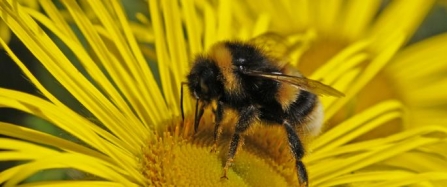
Photo by David Lidstone

Photo by David Lidstone
Many bee species are in dramatic decline with some lost forever from Cornwall and others are on the brink of disappearing. Bees pollinate wildflowers, gardens and crops which form the foundation of Cornwall’s diverse ecosystem, their decline could threaten the survival of other wildlife, flower meadows and agricultural crops.
There are over 270 species of bees in the UK and 85% of all wild flowers, garden plants and crops rely on pollinating insects like bees to flourish.
Changes in habitat, landscape, use of pesticides and climate change are all taking their toll. Loss of good quality habitat across the UK has had a catastrophic impact on bees. Over 90% of Britain’s lowland, flower-rich grasslands have gone, along with 50% of ancient woodland, 40% of lowland heaths, 60% of raised bogs and a devastating 90% of flower-rich fen habitat.
Callum Devaney, Head of Nature Reserves for Cornwall Wildlife Trust says
“Our nature reserves provide a network of high quality semi-natural habitats that are essential for bees and other wildlife. In conserving wild bees we will be ensuring a healthier environment for all Cornish wildlife.”
Using funds raised through the Bee Kind Appeal urgent work will be carried out at the Trust’s nature reserves to provide improved conditions for bees. At Caer Bran and Bartinney Nature Reserves near Sancreed, west Penwith, home to the rare tormentil mining bee, and the tormentil nomad bee, a ‘cuckoo’ bee that lays its eggs in the nest of the mining bee, scrub clearance is urgently needed to encourage wild flowers and create a nesting habitat.
At Penlee Battery Nature Reserve, Rame, the unusual green-eyed flower bee and the declining male long-horned bee are known to visit the bee orchids and areas of grasslands need to be opened up to create a better habitat for the flowers.
Species-rich meadows will be created at Helman Tor Nature Reserve, at Lanlivery, the Trust’s largest reserve, while at Loggan’s Moor Nature Reserve, Hayle, where the wetland has an incredible range of habitats, the clearance of sea buckthorn from the dune grassland slopes is desperately needed to attract rare bees such as the moss carder bee and the brown-banded carder bee.
As well as this urgent practical work, funds are also needed for the publication of a Bumblebee Atlas for recording Cornish bumblebees, plus guidance sheets on wildlife gardening and the creation of wildflower meadows. Activities are planned for schools across the county to make sure that children understand the importance of saving the bees.
Dee Reeves, Trustee at Cornwall Wildlife Trust says,
“Cornwall is home to rare and vulnerable bees. We’re so lucky in Cornwall to have a unique mosaic of habitats, key to these species, that means we can make a real impact on the conservation of these wonderful creatures".
You can also call (01872) 273939 or post a cheque to Cornwall Wildlife Trust, Bee Kind Appeal, Five Acres, Allet, Truro, TR4 9DJ.
You can also donate via Just Giving at www.justgiving.com/beekindappeal or simply text Bees16 followed by £5 or £10 to 70070.